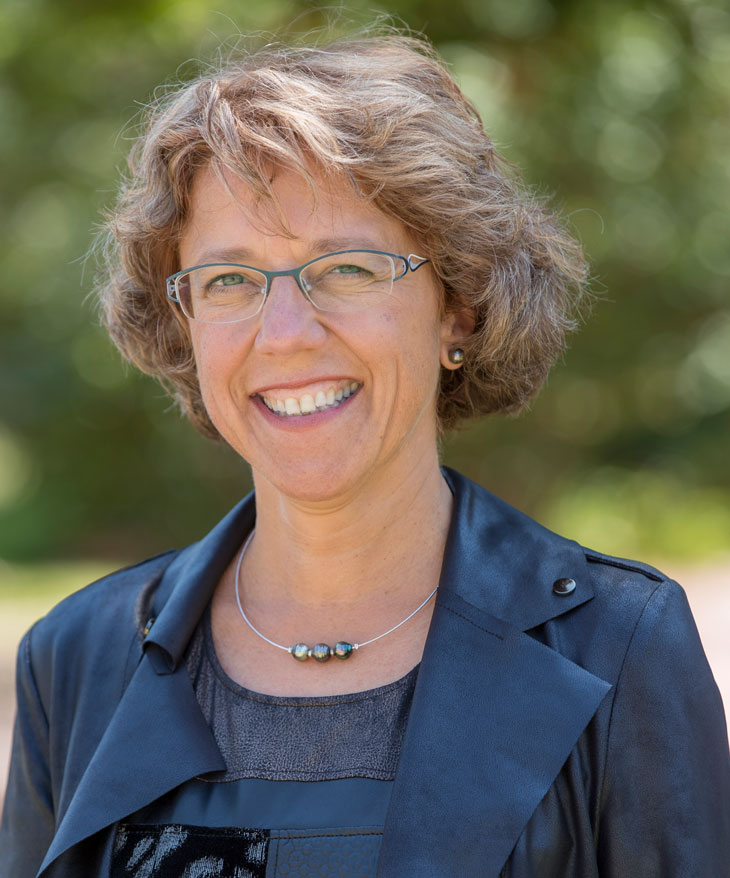
Vet Med Faces of Research: Dr. Veronique Lacombe
Tuesday, January 5, 2021
Veronique Lacombe, DVM, Ph.D., DACVIM, DECEIM, has been asking the same question since she was a child growing up in the south of France, “Why?” The board certified veterinarian, whose research impacts human health, is a professor in the Department of Physiological Sciences at Oklahoma State University’s College of Veterinary Medicine. Educated at the oldest veterinary college in Europe, the National Veterinary School of Maisons-Alfort near Paris, France, Lacombe’s innate curiosity drove her to learn and to discover new knowledge.
“I grew up in a rural area where we were surrounded by animals, primarily by horses,” said Lacombe. “Very quickly I became passionate about animals, especially horses, and developed a strong desire to treat animals. I always asked my parents, why? Why is the sky blue? Why does the tree not grow higher than a certain limit? So I was not only interested about being a veterinarian but soon I was interested in doing research. When I was 10 years old, my mother bought me my first microscope, which is not as fancy as the microscope I now have in my lab but that was a start. And I still ask every day when I wake up, why? This is what makes me want to keep working and to keep trying to have an impact on society by trying to answer this question.”
Lacombe came to OSU’s veterinary college in 2012 where she directs the college’s Comparative Metabolism Research Laboratory.
“I think OSU is one of the world leaders in veterinary medicine,” she said. “They embrace the same philosophy as my veterinary school in France, which is a philosophy of One Health. Any discovery of new knowledge not only will apply to animal health but to human health. One of the reasons I came here is that OSU has been very supportive of my research program. As a vet student I was interested in metabolism – how a cell processes energy. Currently we are studying diabetes and obesity, which are obviously epidemic diseases that affect both humans and animals. More than 350 million people worldwide are affected by diabetes. Specifically, we are trying to understand why diabetic patients have more complications. Why are diabetic patients more predisposed to cardiovascular disease and to respiratory disease? This is a hot topic because several recent studies showed that people who have diabetes are more predisposed to contract COVID-19 and to have complications or to die from that pandemic. We recently received funding not only to study COVID but also to study influenza and how these viral infections affect the diabetic population. We have a third umbrella in my lab, which is to understand diabetic complications in animals such as horses that have their own unique complications when they have metabolic disease.”
Lacombe thrives on answering the question why.
“I tell my students you should treat data like king and queen because they are the foundation of trying to answer the question why. Every time we answer a scientific question, I get excited. Several times in my career we ended up getting an answer which was not expected and that’s opened a completely different field, which is also very exciting.”
Lacombe encourages all students to do research whether they are in high school, an undergraduate student or veterinary student.
“Start doing research early and be motivated. If you find a job you love, you stop working so make research your passion. Also, be resilient. Think outside the box; be creative. Your imagination is the limit. By doing research, we are always at the frontier, at that edge of discovering new knowledge and going beyond the imagination of what people could perceive the world to be.”
In addition to a world renown researcher, Lacombe also teaches at the veterinary college.
“It’s not only about doing research. It’s about creating knowledge and sharing that knowledge. So for me, it’s extremely important to teach. I teach pharmacology, which is the science of drugs and physiology, which is understanding how the body works. I also teach graduate students how to communicate science when we write scientific publication. In addition, I teach students in my laboratory on a daily basis how to do research. I try to communicate with them my passion of research and why it’s important to do research. At the end of the day, we’re trying to have an impact on society.”
Vet Med Faces of Research is a monthly series designed to inform the public about the impact of the numerous studies being conducted at Oklahoma State University’s College of Veterinary Medicine. Advancing knowledge and understanding for the benefit of the lives and livelihoods of the people of Oklahoma is a critical element of OSU’s land-grant mission.
If supporting research at the OSU College of Veterinary Medicine is your passion, please contact Ashley Hesser, assistant director of development with the OSU Foundation, at ahesser@osugiving.com or (405) 385-0715.
